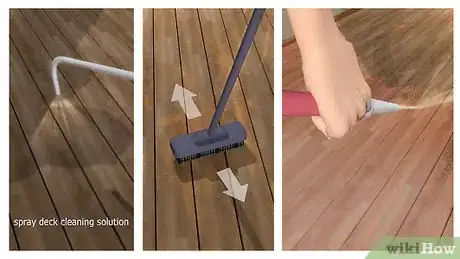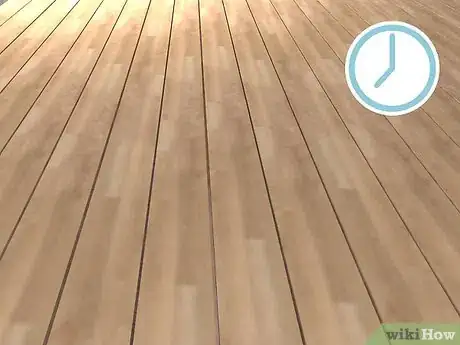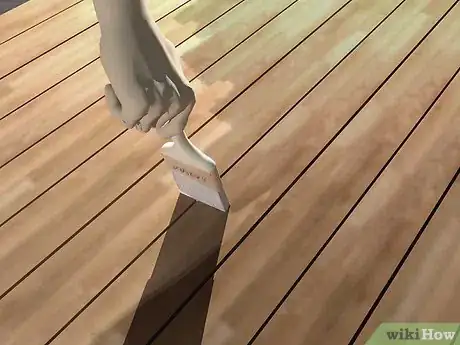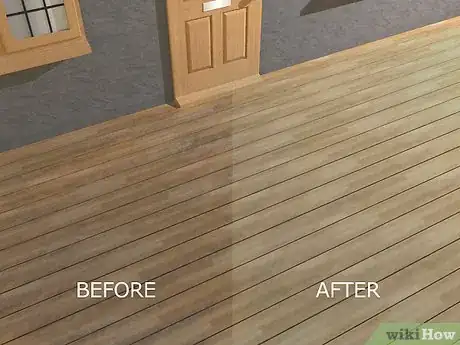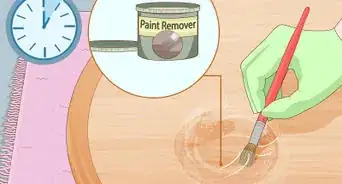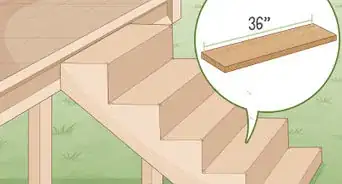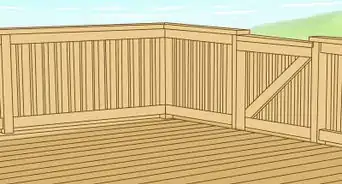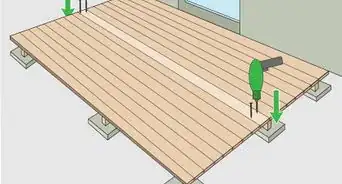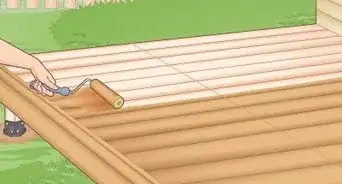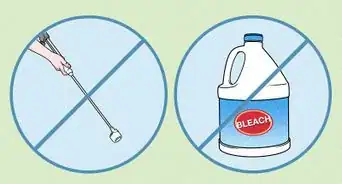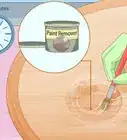This article was co-authored by Jeff Baldwin. Jeff Baldwin is a Residential Painter and the Owner of Baldwin Custom Painting. With two decades of painting experience, Jeff specializes in high-end residential and small commercial painting projects. Dedicated to quality craftsmanship, Jeff and Baldwin Custom Painting provide bonded/insured, licensed, and lead-safe certified services in residential painting, light commercial painting, and wood refinishing.
There are 7 references cited in this article, which can be found at the bottom of the page.
wikiHow marks an article as reader-approved once it receives enough positive feedback. In this case, several readers have written to tell us that this article was helpful to them, earning it our reader-approved status.
This article has been viewed 761,447 times.
Most decks are made from pressure treated pine. Here is how to keep your deck looking great and protected.
Steps
-
1Remove staining, mildew and old finish with a commercial deck cleaning solution. Pressure washing is almost always a must on older decks, but be sure not to use too much pressure. You can damage the wood if it's turned up too high. Usually 1500-2500 PSI is adequate for pressure treated lumber. Stay between 1200-1500 PSI for cedar and redwood.[1]
-
2After cleaning the wood, let the surface dry very well. Most coatings require that the wood should be dry before application. There are exceptions. Thompson's Water Seal Advanced Wood Protectors can be applied to damp lumber, so it's possible to clean and waterproof your deck in one day. Read the directions on the product you're using for temperature and weather guidelines, drying times, etc., and follow them![2]Advertisement
-
3Choose your finish. You can use an oil base or water base sealer or stain, solid or semi-transparent. The best method for applying the material is with a brush or a paint pad on a long handle, available at any hardware store. Most materials can be sprayed also, but you will end up needing a lot more product this way. For a large deck, spraying will save time but you should brush the material into the wood. This will help with uniformity and provide a better looking job.[3]
-
4Finished.
Expert Q&A
-
QuestionDoes pressure treated wood need to be primed?
 Jeff BaldwinJeff Baldwin is a Residential Painter and the Owner of Baldwin Custom Painting. With two decades of painting experience, Jeff specializes in high-end residential and small commercial painting projects. Dedicated to quality craftsmanship, Jeff and Baldwin Custom Painting provide bonded/insured, licensed, and lead-safe certified services in residential painting, light commercial painting, and wood refinishing.
Jeff BaldwinJeff Baldwin is a Residential Painter and the Owner of Baldwin Custom Painting. With two decades of painting experience, Jeff specializes in high-end residential and small commercial painting projects. Dedicated to quality craftsmanship, Jeff and Baldwin Custom Painting provide bonded/insured, licensed, and lead-safe certified services in residential painting, light commercial painting, and wood refinishing.
Residential Painter It's usually a good idea. The best way to seal wood when your intention is to paint it would be to use a stain blocking primer that bonds well. White pigmented shellac is the best because it stain blocks, goes on smoothly, dries fast, sands easily, and locks in odors.
It's usually a good idea. The best way to seal wood when your intention is to paint it would be to use a stain blocking primer that bonds well. White pigmented shellac is the best because it stain blocks, goes on smoothly, dries fast, sands easily, and locks in odors. -
QuestionCan I use boiled linseed oil on treated deck wood before applying Thompson's Water Sealer?
 Community AnswerRead the Thompson's MSDS, it is boiled linseed oil and some solvents. The operative chemical in Thompson's is linseed oil. For generations farmers used linseed oil to protect wood and metal. Thin linseed oil with paint thinner and apply it like Thompson's.
Community AnswerRead the Thompson's MSDS, it is boiled linseed oil and some solvents. The operative chemical in Thompson's is linseed oil. For generations farmers used linseed oil to protect wood and metal. Thin linseed oil with paint thinner and apply it like Thompson's. -
QuestionWhen can I stain a new pressure treated deck?
 Community AnswerIf you treated it during the summer, wait two to three months. If you treated it in the fall, wait until spring.
Community AnswerIf you treated it during the summer, wait two to three months. If you treated it in the fall, wait until spring.
Warnings
- FIRE HAZARD: Before disposing of rags, spread them out to dry completely. Heat generated from evaporating finish on a pile of rags can start a flash fire. If you are using latex stain, clean equipment with soapy water. If you are using oil-based sealers, clean with paint thinner or mineral spirits..⧼thumbs_response⧽
- Do not use varnish!⧼thumbs_response⧽
- The sealant may drip between the decking boards, so use tarps beneath the deck to avoid staining a cement pad.⧼thumbs_response⧽
- Treated lumber does not hold paint well, so avoid painting.⧼thumbs_response⧽
- A clear finish usually needs to be treated more often.⧼thumbs_response⧽
- If the deck is near a chlorinated swimming pool, check your selection of stains and oils because the chlorine vapors can cause some oils to become opaque.⧼thumbs_response⧽
- Be careful when using a sprayer and sealant on decks. The over spray may kill nearby grass and shrubs. To prevent this, cover the adjacent greenery with a tarp or newspapers.⧼thumbs_response⧽
- You will want to wear a respirator and have good air-flow. These products are usually alcohol-based and smell strongly, but the smell dissipates quickly after drying.⧼thumbs_response⧽
- A deck that does not get a lot of sunlight is more likely to have mildew staining and green moss. This is a black staining or green fungus. Try to avoid oil-based products if the deck doesn't get a good amount of sunlight.⧼thumbs_response⧽
- Pressure-treated wood may contain arsenic, so EXTREME caution should be used when sanding it. Arsenic is known to cause cancer in adults and children.⧼thumbs_response⧽
- Use a light-colored stain if your deck gets a lot of sunlight. A dark stain will make the wood get hotter.⧼thumbs_response⧽
References
- ↑ https://www.thisoldhouse.com/how-to/go-old-deck-to-new-4-steps
- ↑ https://www.familyhandyman.com/decks/how-to-revive-a-deck/
- ↑ https://www.familyhandyman.com/decks/choosing-the-best-finish-for-your-deck/
- https://www.todayshomeowner.com/video/protecting-a-wood-deck-with-stain/
- https://www.bobvila.com/articles/homemade-deck-cleaner/
- https://www.todayshomeowner.com/video/how-to-clean-and-finish-a-wood-deck/
- Lowes instructions for cleaning and sealing your deck
